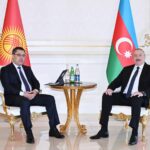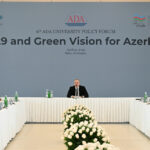Recently, the Paris Business School organized a symposium in partnership with the European Association for the Defense of Democracies on the plight of women in the Islamic Republic of Iran, with a special emphasis being given to non-Persian women living in Iran.
At the symposium, Manel Msalmi, an advisor at the European Parliament who heads the European Association for the Defense of Democracies, proclaimed: “The death of Mahsa Amini has shocked the world and highlighted a characteristic of this regime, namely the oppression and marginalization of women in Iran. It also brought to light the mistreatment of the country’s non-Persian ethnic minorities.”
Namam Islmaili, an Iranian Kurdish demonstrator, noted: “They killed Amini because of the hair that was sticking out of her hijab. Now, the youth are asking for freedom. They are asking for rights for everyone because everyone has the right to live in dignity and freedom.” Msalmi added that Amini, who was Kurdish, was not the only victim, “The body of Atefeh Nami, an Iranian Arab activist from the city of Karaj near Tehran, was recently found on the balcony of her home after being arrested by security forces for participating in the protests.”
According to Msalmi, “The country is all too familiar with the phenomenon of unexplained deaths after arrests in Iran, but the brother of the minority rights activist said that the news was still shocking.” Mohamed Amin Nami, an activist who also lives in Europe, said: “I was completely shocked and devastated when I heard from my family that my sister had been killed.”
According to Msalmi, “If Atafeh was indeed the victim of a crime, then she is the latest of a series of murders and kidnappings that have hit the people of the Iranian province. Muhammed and his sister have long campaigned for the right of Iranian Arabs to learn their language in schools.” And Amini and Nami are not alone. Last year, Aylar Haqqi, a 23-year-old Azerbaijani medical student, was killed by the Iranian regime while attending protests against the mandatory hijab in the city of Tabriz, sparking widespread outrage among the South Azerbaijani community.
South Azerbaijani women face systematic discrimination in Iran, just like Kurdish, Ahwazi and Baloch women do. Sevil Suleymani wrote in Azerbaijani Women in Iran: Oppression, Empowerment, Agency: “The multiple discrimination and inequalities that Azerbaijani Turk women face based on their gender and their ethnicity is identified as “structural intersectionality” similar to women of color experiences in the United States. Azerbaijani Turk women encountered patriarchal customs, systematic economic inequalities, and misrepresentation in Iranian women’s movements. Many Azerbaijani Turk women suffer from patriarchal customs similar to Persian women, however in some instances they do so more drastically than Persian women because of the language barriers and the issue of accessibility to resources. Thus, South Azerbaijani women face triple discrimination: sexism, racism and classism.”
According to Suleymani, “The absence of Turkish language in Iranian schools has created many issues in women’s education. Most children grow up with parents who do not speak Persian. Their first language was and has been Turkish, but when they start using Persian in school; they face various types of discrimination. People are discriminated against in employment opportunities for having an accent and it limits their upward social mobility. Not having access to media and legal systems because of language issues makes these women unaware of their own rights.”
She added: “In the case of Azerbaijani women like Rahele Zamani, a South Azerbaijani woman who was executed for killing her abusive husband, language has been the main problem that leads to failures to understanding the court proceedings, an inability to articulate a defense in a non-native tongue as well as the inability to advocate for their legal rights. In Iran, where the official language is Farsi, the media and schools, and the legal system use Farsi. How can we expect women, who have never had an opportunity to attend school, to learn the Farsi language or be literate in Farsi and thereby do not know the resources of their country?”
Msalmi emphasized, “Although the Iranian constitution theoretically grants equal rights to ethnic minorities, allowing them to use their own language and practice their own traditions, Kurds, Ahwazi Arabs, Baloch, South Azerbaijanis and other groups claim that they are treated as second class citizens. Their cities are being exploited and deprived of investment and their communities are subject to aggressive policing. The non-Persian populations, namely Ahwazis, South Azerbaijanis, Turkmen, and Baloch, have been fighting for decades for their fundamental rights to have access to education and work, but they were always persecuted, arrested by the police and tortured in the prisons. Dozens of Ahwazi women are currently in prison and most of them are tortured.”
South Azerbaijani dissident Saleh Kamrani also spoke at the symposium and said, “Azerbaijani Turks make up to 40 percent of Iran’s population. My people have been fighting for their ethnonational rights, democratic values and human rights for over a hundred years and yet we do not have a single school in our mother tongue. Our language is banned in courts, offices and schools, and we are subject to brutal systematic Persian racism. During the current Iran protests, thousands of Azerbaijani youth got detained and tens of them just got killed.”
He continued: “Azerbaijanis are a suppressed society in Iran. We are subject to linguicide and ethnocide, and we do not have the right to self-determination. I am calling upon all politicians who respect human rights to support ethnic Azerbaijanis in Iran to gain their fundamental freedoms. The current Islamic Republic of Iran and the previous administration of King Mohammed Reza Pahlavi killed many of the Azerbaijani elites. In 1946 alone, the Persian Army of the Pahlavi’s attacked the Azerbaijani region in Iran, killing thousands and committing genocide.”
He added: “The Azerbaijani society was traumatized for years, but despite this oppression, they organized themselves for the last thirty years inside and outside of Iran. Regardless of the progress we have made, we need the support from the free world to help organize our people. We need support to help our political prisoners. We ask for a chance to have hearings in Western parliaments and have more international media coverage. I can assure you that none of the Iranian groups can do regime change alone and the unity and collaboration of all democratic opposition forces pass through mutual respect for different identities in Iran.”
Kamrani noted, “Iran is one of the key destabilizing actors in the Middle East. You can find its footprint in all of the terror organizations, in all of the wars in the Middle East and even in Europe, like in the Ukraine. It causes pain for the people of the region and creates a refugee crisis originating in one of the countries in the region, which you have to deal with. Iran threatens Israel and the range of its missiles can reach all over the EU.”
According to him, “It is making atomic bombs [that threaten the entire world] and it threatens the security of transportation in waterways from the Strait of Hormuz to the Mediterranean and Red Sea. Iran is threatening the Republic of Azerbaijan as one of the energy suppliers of Europe and an ally of the West and Israel. Whatever I say about the harmful effect of the current system of Iran on the free world and the people of the Middle East and Caucasus, it is not enough. It is time to change the system and end the suffering of the people inside of Iran and in neighboring countries and stop the refugee crisis. It is time to end these threats and make a safer world.”
Saieed Hamidan, an Ahwazi leader, concluded: “We are now witnessing a true revolutionary uprising, which all peoples have greeted. This revolutionary uprising, which continues to this day, continues to call for the overthrow of the Islamic Republic of Iran. The people continue to struggle and sacrifice everything to obtain freedom.”
And the West, threatened by Iran’s approaching nuclear capability, could help bring the ayatollah’s rule to an end.
Rachel Avraham is the CEO of the Dona Gracia Center for Diplomacy and an Israel-based journalist. She is the author of “Women and Jihad: Debating Palestinian Female Suicide Bombings in the American, Israeli and Arab Media.”










